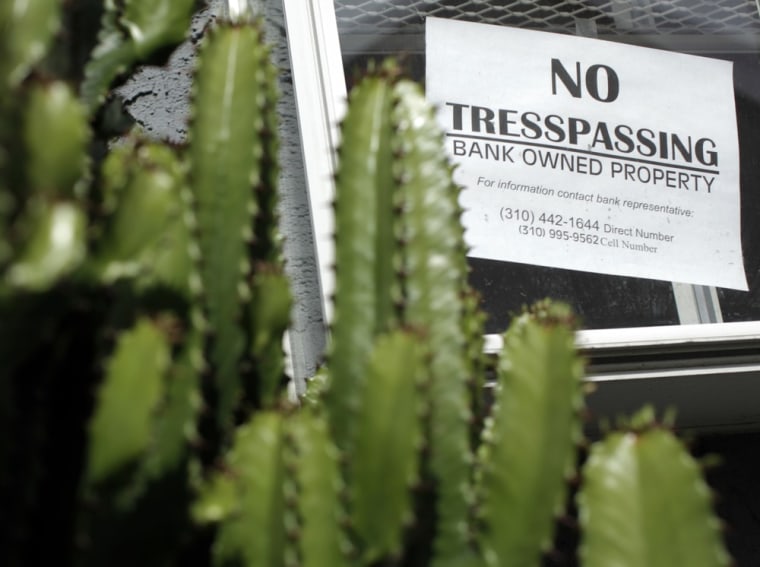It's one of those stories that sounds appalling, that you might hope the media is playing up just for its shock value: responsible and conscientious tenants who suddenly find themselves evicted and out of a home — because the property they are renting is under foreclosure.
At the start of the recession, reports of renters being blindsided by foreclosure notices were not unusual. The problem prompted President Obama to sign the federal Protecting Tenants at Foreclosure Act in 2009. It requires tenants receive a 90-day notice if they are being evicted due to foreclosure — and that most existing leases for renters be honored up to the end of their term.
Foreclosures rising
Some long-time observers of the housing market believe the federal law and an improving economy have reduced the number of tenants caught up in foreclosure. "There's more bark than bite right now in what we're seeing, with ... tenants getting stuck," says Scott Lukes, president of Denver-based Echo Summit Property Management. "However, property management is a hugely fragmented industry, with a lot of smaller players. Individual landlords, people who own one, two, three properties [or] real estate investors that are trying to squeeze blood out of the turnip — those are the areas where there's a lot more risks for renters."
Sponsored links
Lukes says the problem does exist, "especially when you couple foreclosure with Chapter 7 full-on bankruptcy [protection]. It gives a property owner a pretty substantial get-out-of-jail-free card, that really does impact other people's lives." But he's reassured by what he's seen from bankruptcy judges and attorneys who have been forcing defaulting home owners and investors to be more accountable with their tenants.
"The real estate investor that has two dozen properties that they're having a hard time with, and they just want to get out of Dodge and become a school teacher? That ain't happening," he says. "You are responsible for all this stuff and we're not going to let you out like this. So I think this has been a real problem but the system is really, really getting smart about it."
But smartness does not, for the moment, signal an end to the crisis. RealtyTrac released its U.S. Foreclosure Market Report earlier this month. It reported an increase of nearly 4 percent in foreclosure filings — "default notices, scheduled auctions and bank repossessions" — for the third quarter of this year.
"Lenders foreclosed on a record number of properties in September and in the third quarter, taking a bite out of the backlog of distressed properties where the foreclosure process was delayed by foreclosure prevention efforts over the past 20 months," said RealtyTrac CEO James J. Saccacio in a press release.
"We expect to see a dip in those bank repossessions — and possibly earlier stages of the foreclosure process — in the fourth quarter as several major lenders have halted foreclosure sales in some states while they review irregularities in foreclosure-processing documentation that has been called into question in recent weeks."
Renters pulled back in
At the start of the recession, Dr. Ron Throupe, assistant professor at the University of Denver's Daniels College of Business Burns School of Real Estate and Construction Management, saw the reports of renters caught up in foreclosure nightmares.
And now, he says, he has friends who are in the very same fix. One of them called Throupe last week, saying his family "got what I call a 'tack-and-send'; they tack the notice to the door. It was for his landlord, who was late on his mortgage. This guy's living there, he has aspirations to purchase the place, his lease ends in February — he's like, 'Ron, what can I do?'"
Dr. Throupe thinks this might be phase two of the mortgage mess, as homeowners who survived the first tsunami of the post-housing bubble struggle to hold on to their properties. "Two years ago I saw quite a bit of it," he says, "and now I'm seeing it again. I suspect [some] people are trying to rent the place for a while; maybe that worked, the lease got them half-way home on their debt, [but] now it's coming home to roost and they're still not making their debt."
And the renters, meanwhile, are unwilling players in the so-called "shadow market." Those are houses "that would be on the market if [their owners] felt they could sell them," says Dr. Throupe. "A lot of those are renting; [their owners] trying to buy time to get to a better market condition."
The shadow market also leaves some renters wondering if they'll ever get back their security deposits, advanced rent payments and other out-of-pocket expenses. That concern, plus the uncertainty of whether to pay the property owner or the bank, has prompted some tenants to simply withhold payments altogether.
"I've heard that to some extent and I can't blame them," say Throupe. "Technically, who owns the rent? There's still a contract in place, but it's like that movie, Catch Me If You Can."
But Lukes notes that, legally, the renter is obligated to pay their landlord, even through this whole, awful awful process. "We get that question a lot," he says.
